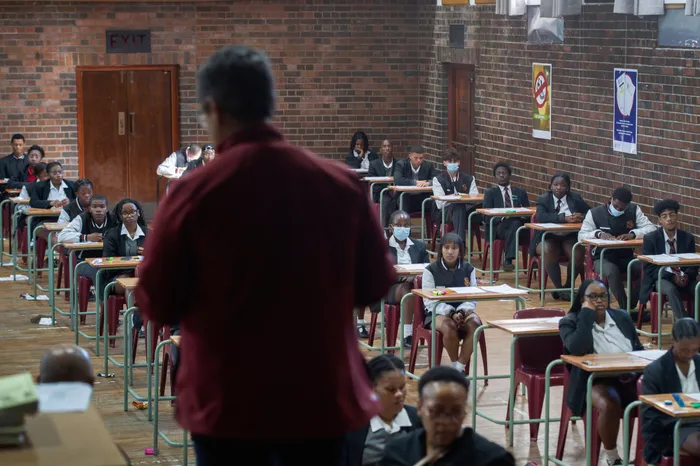Austerity measures will impact higher education options

Picture: Armand Hough / Independent Newspapers / Taken on October 30, 2023 – Grade 12 learners sit for their first paper, English additional language at Sea Point High School. Matriculants who opt to work rather than further their studies may find it hard because basic education does not provide the skills to make a meaningful contribution in the mainstream economy, the writer says.
By Hendrick Makaneta
The examinations for the matric Class of 2023 have come and gone. There is no doubt that there are different options available for those who pass their final examinations.
Since the level of unemployment among the youth has reached alarming proportions, matriculants who opt to find work as opposed to studying further may find it difficult to enter the job market due to the fact that basic education does not provide the skills to enable them to make a meaningful contribution to the country’s mainstream economy.
So, the next logical step to take is to explore the different qualifications offered by the post-school education sector. Like basic education, the post-school education sector consists of public and private higher education institutions.
Those who can afford the tuition at private higher education institutions will be easily accepted if they qualify.
However, the majority of matriculants will have to fight for limited space in public higher education institutions.
What is important to note, however, is that some of the post-matric study options will be guided mainly by the subjects chosen by pupils at the end of Grade 9 coupled with their academic performance in matric.
Pupils who wish to pursue a degree or a diploma will be faced with important decisions about where to enrol for their tertiary education.
Universities are still considered the first option for most students, especially because they offer Bachelor’s degrees, which are considered higher in academic status than diplomas and certificates.
The cost of studying towards a degree at university is also higher than that of studying for a certificate at a TVET college.
We need to encourage students to also consider TVET colleges as alternatives because of the skills they will acquire.
Not everyone should go to a university. The government should also expand the capacity of TVET colleges to ensure that a large number of students are admitted.
While noting the steps taken by Higher Education Minister Blade
Nzimande concerning the funding of the so-called missing middle students, we should also be worried about the planned budget cuts which will undoubtedly affect the students from poor communities.
An increase in student enrolments will further exacerbate the funding crisis experienced by the National Student Financial Aid Scheme (NSFAS).
The funding crisis will also mean that some of our students may find it difficult to cope with other costs of higher education such as accommodation, books and transport. It should be clear at this point that the government alone will not be able to resolve the many challenges faced in the education sector.
The concerns raised by the captains of industry about corruption in the government should not be taken lightly, especially if we wish to call for the private sector to support and help alleviate the challenges faced by NSFAS.
Support for students should not be limited to funding. Students also need to be supported emotionally so that they can cope in new environments, away from their families.
The fight against gender-based violence should be taken more seriously, given the fact that at some universities, female students have been raped or assaulted. Even male students have to be supported emotionally. Also, the fact that not all students are able to graduate on time should be a cause for great concern because it means that additional fees have to be paid for every extra year that the student is enrolled.
The government should be more proactive in planning for the academic year 2024. The last thing that we want is protests by students. Based on the number of student applications, we know that the demand for education far exceeds the available funding.
Funding should not be viewed as an additional burden on the coffers of the state, but rather as an investment for the future. Students who receive funding stand a much better chance of completing their qualifications than students who do not receive financial assistance.
The challenges presented by the 2024 academic year will also mean that students should be more resilient and adapt to new realities. Structural changes in the economy mean that students should be more careful about choosing their careers.
They should choose wisely to avoid future disappointment as a result of unemployment.
Universities still offer courses which prepare students to be successful in an economy that does not exist. It is up to students to identify the courses that are in demand in the economy.
Hendrick Makaneta is an education activist completing an LLB degree at the University of Pretoria